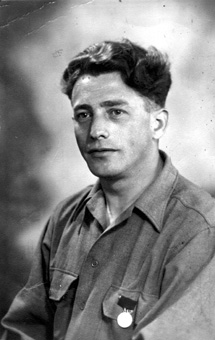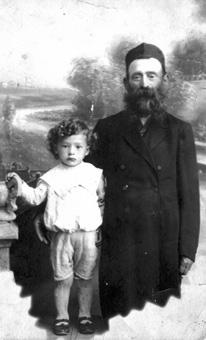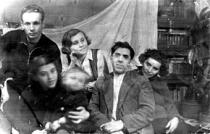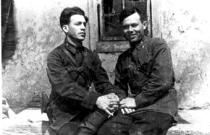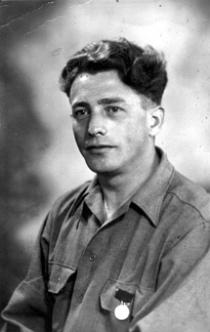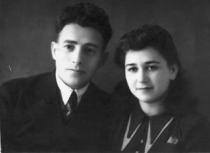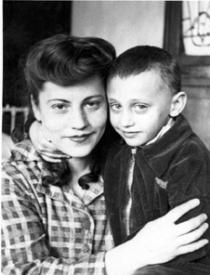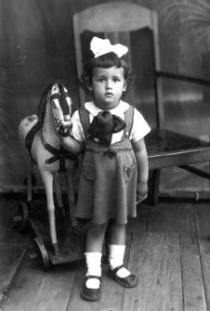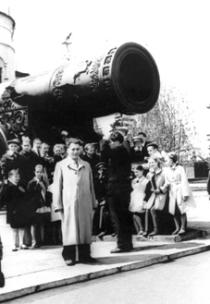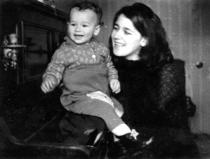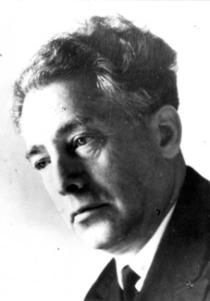I, Rahmil Shmushkevich, after liberation from the camp. I have a medal of French partisans on my shirt. Photo made in Germany on 10 May 1945, Victory day.
We, about 300 prisoners-of-war got free on 18 March 1945 and went to the Alps mountains. We had weapons and I became commander of battalion of former inmates of the camp. American units were moving in the Eastern direction and we met with them in Trier, Germany. (Editor's note: where Karl Marx was born). We were all so happy about our victory. Americans treated us very nicely and arranged a reception in our honor. There was a professor from Philadelphia at the reception. He approached me and asked me whether I was a Jew, giving me a wink. There was commission for repatriation of Soviet citizens and the USSR Embassy in Paris. I got in touch with Paris requesting instruction my conduct in Trier and with Americans (Editor's note: Soviet people could only contact or communicate foreigners upon obtaining permission from the Party and governmental officials). I was summoned to the Soviet Embassy in Paris. In Paris I met quite a few participants of French Resistance. I met a communist writer Elsa Triolet and her husband Louis Aragon . I also met Marcel Cashin who was the editor of the "L'Humanite" newspaper. On the eve of 1 May 1945 Charles de Gaulle, President of France, arranged a military parade and invited two Soviet battalions: one of them was the one under my commandment. The Communist Party of France awarded a medal with Stalin's portrait to me. This was a special award for Soviet prisoners-of-war. I was also awarded a medal "de la Legion d'Honneur". It vanished during a search that was conducted at my home in 1949.
In May 1945 I was called by Chairman of the Repatriation Commission General-Colonel Golikov. He gave me a task to write a play persuading Soviet citizens to return to their Motherland, because many girls were meeting French or Italian men and intended to stay in their countries. I wrote the play "Meeting" about returning to our Motherland and a happy future life. It was a lie on my part, but I didn't just lie to my comrades and friends - I lied to myself. I believed in what I had written. Even Elsa Triolet, a communist, whispered to me "Stay here. In France. Do you know what is happening there? Numbers of people are arrested". I told her that I couldn't possibly be arrested after my struggle with partisans and in the underground, when de Gaulle greeted me in person in the Soviet Embassy. No, I said, this couldn't be possible.
I went in Paris several times. At last in the end of July 1945 we were ordered to get on the train to the Soviet Union. How happy we were to cross the border of our country and find ourselves in our own country. We were taken to the woods in Byelorussia. We had given away our weapons before getting on the train. We were lined and I heard some noise. I looked back and saw that we were encircled by the NKVD (People's Commissariat of Internal Affairs) troops. There were about 300 of us. We were escorted to the barracks. We were staying there for some time. Our position was uncertain. Every now and then we were asked general questions. We were not allowed to leave the area of our camp, but we were allowed to write letters home. I decided to not notify my family where I was. I hadn't heard from them since 1942. In April 1946 I was called to the headquarters along with several dozens of my comrades. We received our documents and went to Kiev. All of my comrades got into Stalin's camps sooner or later. Some of them were sent to Siberia from Byelorussia and some were exiled later, in 1949.
